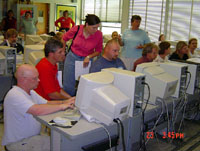The project activities can be divided into different categories. Those highlighted in this section include classroom activities by middle school students, field trips by middle-school students, and training activities for project participants. Contents of selected classroom activities are provided in the section on Lesson Plans and Units. Work geared towards disseminating project activities is highlighted in the section on Dissemination.
Summer 2004 ISMAM Workshop
[ Click to see photos ]
 For the successful implementation of the project plan, it is absolutely critical that all participants be provided with appropriate training. This is achieved through several professional development activities throughout the year. However, the major initial training for all participants is the week-long workshop conducted each summer. The following is a list of goals for the 2004 summer workshop. Items in red were new additions to the summer workshop agenda based on experiences during the 2003-04 academic year.
For the successful implementation of the project plan, it is absolutely critical that all participants be provided with appropriate training. This is achieved through several professional development activities throughout the year. However, the major initial training for all participants is the week-long workshop conducted each summer. The following is a list of goals for the 2004 summer workshop. Items in red were new additions to the summer workshop agenda based on experiences during the 2003-04 academic year.
- An understanding the project goals.
- An understanding the organizational structure of the project.
- An understanding of the responsibilities of the various categories of participants.
- Meeting team mates and all other project participants.
- Becoming aware of project assessment requirements.
- An appreciation of middle school characteristics, including discipline, classroom management and inclusion of special needs.
- An understanding of confidentiality issues pertaining to middle schools.
- Becoming aware of legal issues pertaining to middle schools.
- An appreciation of Appalachian learning styles.
- An understanding the CATS testing.
- Gaining increased familiarity with internet-based communication including e-mail, Blackboard, and World Wide Web.
- Becoming familiar with technology relevant to the project, including CBLs, Lego Robots, interactive software and digital microscopes.
- Training in constructivist science teaching.
- Training in inquiry-based teaching strategies in the sciences.
- Training in inquiry-based teaching strategies in mathematics.
- Becoming familiar with inquiry-based curricular materials that are aligned with Kentucky and national standards.
- Planning ways to incorporate inquiry-based strategies and curricular materials in specific classes taught at schools by teachers participating in the project.
- Gaining increased familiarity with Kentucky and national mathematics and science standards.
- Gaining increased familiarity with participating schools' curriculum standards.
- Becoming aware of progress made on project objectives to date.
- Brainstorming on means of disseminating project activities, means of sustaining project activities beyond NSF funding, how to institutionalize the project activities at EKU and issues pertaining to grant renewal.